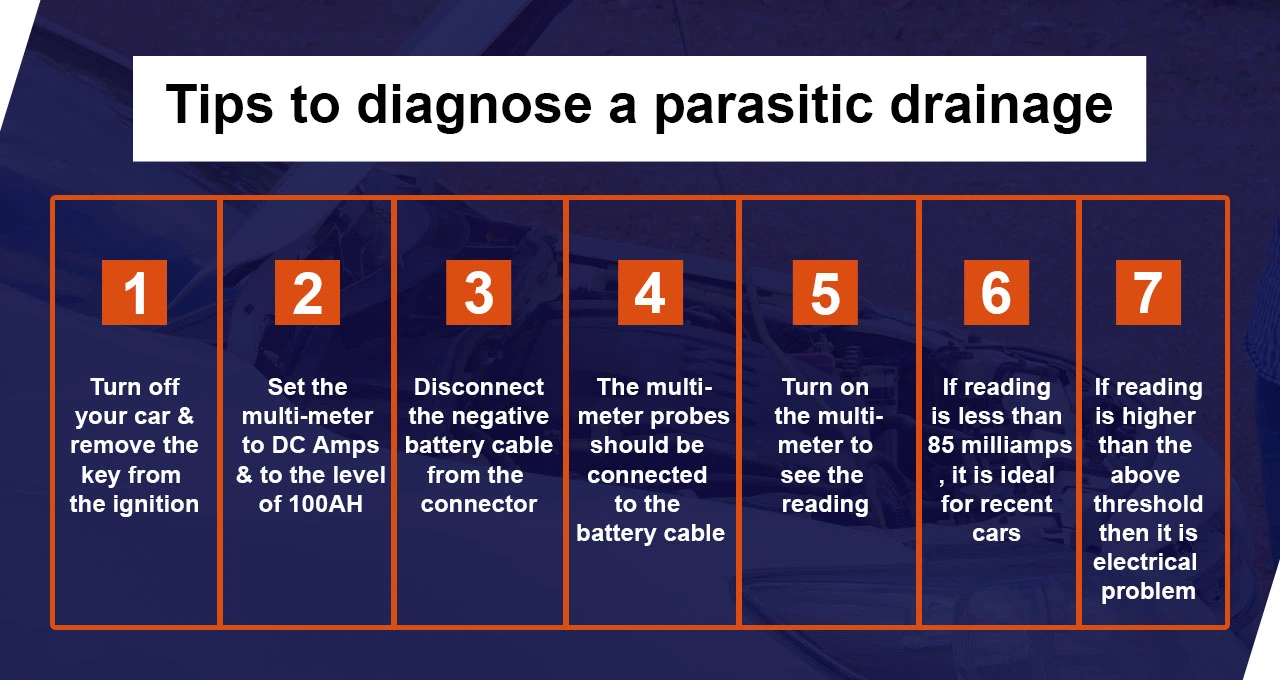Well, it happens more often than you can think of. You just bought a new battery, and after a couple of months, it dies? It’s normal. Your first reaction is to take advantage of the warranty and call the customer service line asking for an automobile battery replacement based on your warranty card.
Once the battery is checked, it mostly shows a very low state of charge, which will, of course, affect its capacity to start the engine and provide sufficient power for the car (It will have low CCA and low reserve capacity in minutes.).
Under warranty, battery misuse occurs when discharging it, and it is not covered by warranty for car battery replacement. Nonetheless, if this happens again after charging it, then it’s evidence that your car has a parasitic drain on the car battery.

Understanding the Parasitic Drain in a Car
Parasitic drains in a car happen when all the electrical systems are off and the energy from the battery continues to be drawn. In such scenarios, everything in the car that needs a power supply to operate is off as it should be, but the battery continues to drain. In this case, the next day, your battery will be almost drained, and starting the engine can be challenging. You might need a jump-starting service!
It’s different from using your headlight while the engine is off or leaving the light inside the car to stay on all night.
To some extent, a typical small parasitic drain can occur due to computers, radios, internal clocks, alarms, power mirrors, and other electrical components that usually cause a little draw, known as a parasitic drain. Most car manufacturers will recommend a specific battery power in AH that accepts a tiny paretic drain for typical car usage. In case you plan to use your car less often or leave it longer without using it, it is better to have the engine run idle for 30 to 40 every week to keep the battery charged and ready for cranking the engine again when needed.
When the amount of electricity pulled exceeds the normal range, however, it becomes a concern that may impact the state of charge and health of your battery and it will lose performance and longevity over time.

How can we diagnose a parasitic drainage
The best option is to get it checked by an auto electrician.
Nonetheless, if you want to DIY, you will need a multimeter to investigate the matter. The following is how it works:
- Turn off your car and remove the key from the ignition
- Set the multimeter to DC Amps and to the level of 100AH + in order, then you go down in Ah if you have no reading
- Then you disconnect the negative battery cable from the connector on the battery and seal the cable so it doesn’t touch the car body
- Then the multimeter probes should be connected to the battery cable (negative pole). The multi-meter should be off while performing this level with the battery terminal.
- Then you turn on the multimeter: If no reading displays then lower the setting of the amps until you get a reading.
- If reading is less than 85 milliamps, it is ideal for recent cars. For older car models, it should be below 50 milliamps.
- If reading is higher than the above threshold then you have an electrical problem to be checked by a professional mechanic.
What would be the issues:
It can be one of the circuits that power your car’s accessories, such as lights, radio, speakers, or another gadget, could be malfunctioning. Once fixed, your battery will not be drained anymore and would give you good service without unexpected power failure.
Now if you are having a parasitic drain within the accepted range, you should make efforts to make less short trips and use the battery power with responsibility (always check no light left on for the night). Do take a long drive from time to time in order to fully charge your car battery.
DO YOU REQUIRE A NEW CAR BATTERY?
Mr VOLT, your local car battery replacement service provider in Dubai, can provide you with high-quality, long-lasting batteries.
Do call 800 VOLT now!


